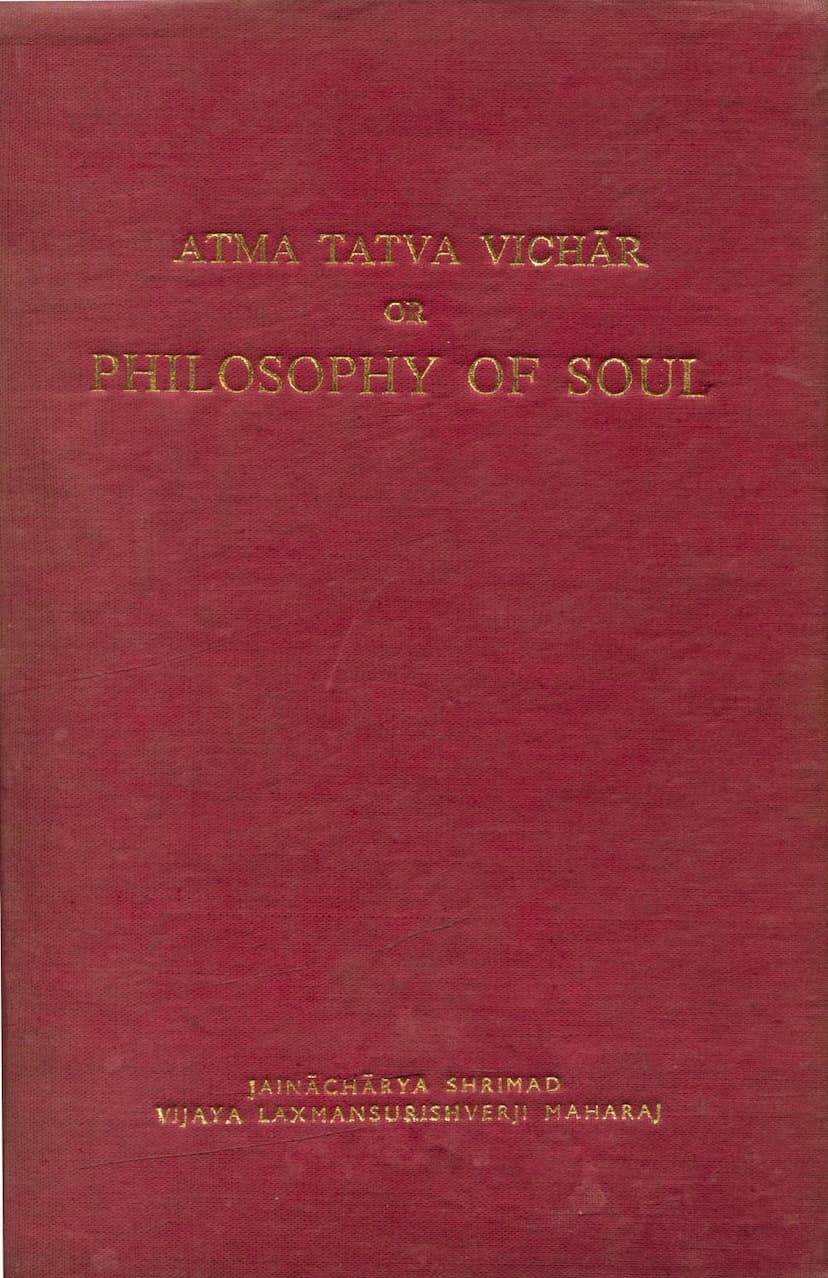Atmatatva Vichar Or Philosophy Of Soul
Added to library: September 1, 2025

Summary
This Jain text, "Atmatatva Vichar Or Philosophy Of Soul" by Shrimad Vijay Laxmansurishverji Maharaj, translated by Prof. Ghanashyam Joshi and compiled by Kirtivijay Gani, published in 1963, is a comprehensive treatise on the fundamental principles of Jainism, focusing on the soul (Atma), karma, and religion.
Core Concepts:
The book is structured into three main parts: Soul, Karma, and Religion. It delves deeply into the Jain understanding of these concepts, aiming to provide clarity and guidance for spiritual progress.
Part 1: Soul (Atma)
- Existence of Soul: The text begins by establishing the existence of the soul, differentiating it from the physical body. It argues for the soul's existence based on observable effects and analogies, similar to how wind or electricity are known through their operations.
- Distinction from Body and Senses: It argues that the soul is a distinct, eternal, and indivisible entity, separate from the body, senses, mind, and vital forces (Prana). The soul is the operator of the physical mechanisms of the body.
- Nature of Soul: The soul is described as being formless, possessing infinite knowledge, perception, power, and bliss, though these qualities are currently obscured by karmic matter. The soul has the capacity for contraction and expansion, matching the size of the body it inhabits.
- Number of Souls: Jainism posits that souls are individual and innumerable, not a singular universal entity (Brahman). The text emphasizes the distinct individuality of each soul.
- Indivisibility of Soul: The soul is presented as intrinsically indivisible, unaffected by physical or temporal divisions.
- Rebirth: The concept of rebirth is central, explaining that the soul transmigrates through various life forms (84 lakh types of births) to experience the fruits of its past actions (karmas). Forgetting past lives is attributed to the intensity of the experience of birth and death, or the bliss of new life, rather than non-existence.
- The Power of Soul: The text highlights the immense, albeit currently obscured, potential power of the soul, drawing parallels with the powers attributed to prophets (Tirthankaras), Baladevas, Vasudevas, and Chakravartis, all of whom are seen as individuals who have realized a significant portion of their soul's inherent power through spiritual discipline.
- Treasures of the Soul: These treasures are identified as Knowledge and Intuition (Darshan). The text explains that true spiritual joy originates from within the soul, not from external objects, and that the soul is an inexhaustible reservoir of bliss (Ananda).
Part 2: Karma
- Nature of Karma: Karma is described as a subtle, material entity that adheres to the soul, obscuring its inherent qualities and causing its bondage and subsequent transmigration. It is not merely a concept but a real, albeit imperceptible, substance.
- Causes of Karmic Bondage: The primary causes of karmic bondage are identified as:
- False Belief (Mithyatva): Holding incorrect views about reality, the soul, or the path to liberation.
- Attachment (Avirati): The absence of detachment from sensual pleasures and worldly affairs.
- Passions (Kashaya): Anger, pride, deceit, and greed, which pollute the soul's pure nature.
- Frivolity (Yoga): Vibrations or activities of the soul (mental, verbal, and physical) that attract karmic particles.
- Eightfold Karmas: The text details the eightfold classification of karmas, which are categorized as:
- Ghati Karmas (Destructive Karmas): These directly affect the soul's intrinsic nature and are considered "cruel" because they obscure knowledge, intuition, bliss, and power. They are Knowledge-obscuring (Gnanavarniya), Intuition-obscuring (Darshanavarniya), Feeling-producing (Vedaniya), and Bliss-obscuring (Mohaniya).
- Aghati Karmas (Non-Destructive Karmas): These do not directly affect the soul's fundamental nature but influence its circumstances in the material world. They are Age-determining (Ayushya), Personality-determining (Nama), Status-determining (Gotra), and Power-hindering (Antaraya).
- Manifestation and Modification: Karmas are constantly contracted but manifest their results only when they mature. While some karmas are rigid and unavoidable, others can be modified or weakened through spiritual practices.
- Penances (Tapas): Penances, both external and internal, are presented as the primary means to annihilate karmas. The text emphasizes the importance of intentional and zealous practice of penances for effective karma destruction.
Part 3: Religion (Dharma)
- Essentiality of Religion: Religion is deemed essential for spiritual progress, liberation from karmic bondage, and achieving true happiness. It is presented as the ultimate guide and protector for the soul.
- Definition and Characteristics: Dharma is defined by its ability to sustain and elevate the soul, characterized by non-violence (Ahimsa), self-restraint (Samvara), and penance (Tapas).
- Practice of Religion: The text stresses the importance of practicing religion from childhood and maintaining consistent effort. It critiques superficial religious observance without genuine understanding or conviction.
- Right Belief (Samyak Darshan): The foundation of true religion is right belief, which involves understanding the true nature of the soul, karma, and the path to liberation, coupled with faith in omniscient beings and their teachings.
- Gunasthana (Stages of Soul's Attributes): The text details fourteen stages of spiritual progress, illustrating the soul's journey from initial false belief through various levels of self-restraint and passion reduction, culminating in omniscience and liberation. Each stage represents a progression in the soul's purity and realization of its true nature.
- Virtues: The book advocates for virtues like humility, politeness, straightforwardness, generosity, peace, forbearance, and self-restraint as essential for spiritual growth and for mitigating karmic influences.
In essence, "Atmatatva Vichar" provides a comprehensive roadmap for understanding the Jain worldview, emphasizing the soul's eternal nature, the pervasive influence of karma, and the transformative power of righteous conduct and spiritual discipline (Dharma) as the means to ultimate liberation and bliss.